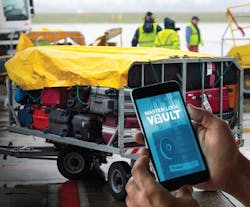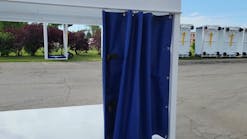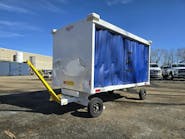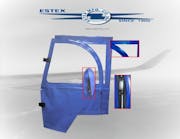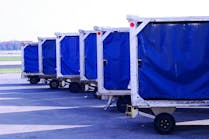Securing Baggage Tractors With Bluetooth
At the airport, security is an ongoing and ever-evolving challenge. And while many people will imagine TSA wait lines, body scans and the advent of airline biometric boarding when thinking of airport security, operations on the ramp are equally in need of efficient security. To help accomplish that at Denver International Airport (DEN), Southwest Airlines’ maintenance and operations team partnered with Master Lock, bringing Bluetooth-backed security to baggage tugs beginning in 2018.
“Simply put, the Southwest Airlines operations team at Denver International Airport was seeking a solution to ensure that luggage tugs were always available when and where we needed them so that employees could quickly transfer luggage from planes to baggage reclaim areas,” says Pat Brumm, manager, Southwest Airlines at DEN. “With that primary goal of streamlining luggage tug access and improving operational efficiency, it was critical for us to transition from mechanical padlocks to an easy-to-use electronic solution, allowing administrators to efficiently control which employees can access their assigned luggage tugs.”
To accomplish the goal, Southwest began utilizing Master Lock’s Bluetooth Padlocks and Master Lock Vault Enterprise platform for the management of their tugs. The Bluetooth padlocks have done away with the literal turnkey functions of traditional padlocks, unlocking instead with the Master Lock Vault Enterprise app and enabling administrators to easily grant and revoke access to the padlocks.
“All of our products now have a brain inside them and they're electrically driven. So you can actually unlock any of our new Bluetooth lock products using our Master Lock Vault Enterprise app, where a user can just walk up, push a button to wake up a lock and then touch a button on their screen in our app that unlocks that lock,” describes Brad Smith, director of software product management at Master Lock. “So very, very easy and seamless. There’s no key whatsoever.”
The padlocks also have a directional, numeric keypad on them for a secondary unlocking option – a great choice, Smith says, for granting short access to temporary personnel, such as repair contractors.
“You can facilitate access to that lock using an actual code-based system, both a permanent one that you can change on the fly as well as assigning a temporary code that constantly changes. You can give temporary access and not worry about having to revoke that access,” adds Smith.
The upside to the keyless system is just that – no key – meaning there’s never a worry of losing a key, or having one copied or stolen. These were all concerns that Southwest had prior to the switch over.
“Previously, we utilized mechanical padlocks to immobilize luggage tugs and ensure employees couldn’t access tugs if they weren’t authorized to do so. There’s the risk of employees losing physical keys, an individual making duplicate keys, or former employees forgetting to return keys before leaving. By leveraging Master Lock Vault Enterprise, which integrates Bluetooth-enabled padlocks, a mobile app and web platform, we eliminated the need for physical key management altogether and gained the on-demand access we needed for efficient management,” elaborates Brumm.
Keyless, however, doesn’t mean less secure.
“We emphasize the needs of the highest security applications, both in aviation as well as instances of oil and gas and power and utility companies that are using these,” says Smith.
The overarching benefit of Master Lock’s keyless systems is an increase to user accountability. Each time a padlock is accessed, the phone unlocking it is logged and tracked.
“The fact that people are using these codes or their phones allows administrators to track when those locks are opened, how and by who. Then, that lock will actually record those interactions and synchronize those up to our platform so administrators can see who is opening those locks – where on a map those locks are being interacted with, opened and closed, and who, where and when those are being used,” Smith says.
“All that happens behind the scenes. There's no plugging cables in or trying to do a data upload or download. All of this is built in behind the scenes in our platform,” he continues. “If a tug gets secured and locked up and parked in another spot, maybe different than where someone was expecting and they're going, ‘boy, where's that tug?’ They can actually just look at the Master Lock Vault Enterprise app, see it on a map and hone in on it.”
“By using a keyless solution and assigning employees access to luggage tugs by user, we are able to ensure the right employees have access to the right equipment at the right time. And through audit trails available in the Master Lock Vault Enterprise web interface, we can track previous lock activity and identify the luggage tug’s last accessed location, allowing us to track down luggage tugs when needed – ultimately increasing accountability,” Brumm adds.
And privacy advocates can rest easy knowing that Master Lock has taken steps to secure personal data. Smith says Master Lock never continually tracks a worker’s phone – only logging the time and location where the Master Lock Vault Enterprise app interacts with a padlock.
The boon Master Lock’s keyless products have had to Southwest’s security and administrative peace of mind while evident, wouldn’t have been possible without the padlock’s ease of integration and support from the employees using them.
“Master Lock was able to implement and shift access to the Master Lock Vault Enterprise system and train employees in just a few hours combined,” says Brumm.
“What took the longest time was just helping inform their teams of the new product and making sure they have their app and user account installed, which is very easy. It's just like if you sign up for a Gmail account – they get an email, they reset their password and they're up and running. So, from that respect, it really only took probably a couple of days,” says Smith of how long it took to get Southwest operating on Master Lock’s system.
“Employees were able to adapt to the Bluetooth Padlocks fairly quickly and rated their overall satisfaction of Master Lock Bluetooth Padlocks at a four out of five stars. In a busy, time-driven environment like an airport, our employees value the efficiencies that give them time back in their workdays. Our employees love that they now can access tugs on demand and do not need to physically go anywhere to retrieve or return keys,” adds Brumm.
The partnership between Southwest and Master Lock is ongoing at Denver International Airport and Brumm says they’re sharing their experience using Master Lock Vault Enterprise and the Bluetooth Padlocks throughout Southwest Airlines. The feedback from Brumm and his employees has also helped Master Lock refine the systems.
“The biggest thing that originally was time-consuming for Southwest was actually registering all those locks and getting them in place in their system. But again, that's a great example of an area where we worked with them, understanding the pain point. Since then, we have built a new tool that allows administrators to scan their new locks via the camera scanning capability in the Master Lock Vault Enterprise app,” Smith describes. “This cuts down on installation time significantly and allows administrators to deploy hundreds of locks within just a few minutes.”
“Then we also have built a quick user upload process where you can essentially copy and paste a user list out of Excel or an alike program. You can add literally hundreds of thousands of locks and users within just a couple minutes,” he adds. “It's really, really quick to deploy now through some of the improvements that we made after working with Southwest.”
For other ground support crews looking to adopt the same, or similar, systems, Smith offers some advice on what to consider before making the switch. He says the two important factors to consider are security and convenience. Not all locks are created equal and a team should determine what level of security they need before heading to a hardware store and purchasing the first padlock on the shelf. However, security, Smith notes, needs to be balanced with ease of use and how quickly locking and unlocking takes. For the fast pace environment of an airport, the most secure lock on the planet may harm operations more than help if it takes too long to use.
“That's something that I think is really important when somebody is looking at deploying a solution in general, be it ours or any other one, is what's the security use case? What's the right hardware and what's the right balance of security versus convenience, and how do you find a solution that's going to match that need? There are instances where somebody could accidentally create something that's too well secured, and in the instance of ground operations with those tugs, they start to ball up all your operations and people struggle to move things quickly to where they need to be because they're struggling to get the right access. You've got to make sure you have that efficiency too,” Smith elaborates.
With that in mind, Smith says more and more operations across the aviation field are beginning to adopt Master Lock’s Bluetooth Padlocks and Master Lock Vault Enterprise, with airports using them to secure access points and perimeter fences, for example.
And for Brumm, his utilization of the keyless systems isn’t ending anytime soon.
“Southwest Airlines is known for providing superior customer service and our daily operations play a key role in our success. In a busy, time-driven environment like an airport, it’s critical that we can effectively and efficiently manage access to our tugs so they’re available when and where employees need them,” he says. “Managing access to equipment can be a tedious task for operations managers that can cause hiccups in operations. For any airlines or airport operations teams looking to better manage employee access to equipment, I’d recommend Master Lock Vault Enterprise and Bluetooth products as a smart, simple and secure way to manage that access.”
